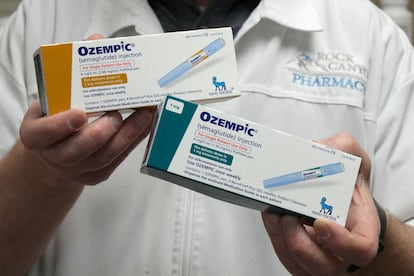New drugs against obesity reduce the risk of heart attack and stroke by up to 20%
The pharmaceutical company Novo Nordisk, which manufactures Ozempic and Wegovy, says that these medications minimize cardiovascular diseases in overweight people

New anti-obesity drugs reduce the risk of heart attack and stroke by up to 20% in overweight people. The pharmaceutical company Novo Nordisk shared the results of its study in a press release: the medications were shown to reduce the risk of suffering adverse cardiovascular events in people with obesity and overweight; these effects had already been demonstrated in patients with type 2 diabetes. This study is awaiting publication in a scientific journal and is expected to be presented at a medical conference at the end of this year.
GLP1 agonists are a family of drugs marketed under different brand names such as Ozempic, Wegovy and Mounjaro. They are known to help people with type 2 diabetes regulate their insulin levels and help them achieve weight loss of up to 15%. That weight loss is associated with a decrease in cardiovascular disease. “The previous hypothesis was that if these GLP-1s could reduce [adverse cardiovascular] events in people with diabetes because of their anti-inflammatory properties, they could do the same in people without diabetes,” explains Cristóbal Morales, an endocrinologist at the Virgen de la Macarena Hospital in Seville, Spain, and the study’s national coordinator. “This is revolutionary,” he says.
The drug trial began in 2018 and involved 17,604 overweight or obese adults over 45 years of age with a history of cardiovascular disease but without diabetes. One group of participants was given a 2.4 mg dose of subcutaneous semaglutide (marketed under the name Wegovy) while the other was given a placebo. After five years, the comparison between the two groups is clear: “A 20% reduction in such a short time is highly significant clinically,” Dr. Morales points out.
The study was conducted in 41 countries, and its complete results will be presented at a meeting of the American College of Cardiology in Philadelphia at the end of 2023. But these results have already had an immediate impact. Shares in the Danish pharmaceutical company Novo Nordisk, which manufactures Ozempic and Wegovy, soared by 16% after the study was made public.
The data from this recent study could lead insurance companies to include these drugs in their portfolio for people who suffer from obesity and overweight. In Spain, Ozempic is financed for diabetic patients, who can get four doses for €4.24 ($4.64). People with obesity and related health problems have to pay €130 ($142.33) for the same amount.
“The Hollywood drug”
Obesity is a chronic disease that affects millions of people worldwide. It is a comorbidity in over 200 diseases, including cardiovascular problems. According to the OECD, complications from overweight account for 9.7% of Spain’s total health expenditure. The use of GLP 1 receptor agonists could lead to a significant reduction in healthcare spending and save millions of lives.
Although some of these drugs have been prescribed since 2017, their popularity seems to have exploded in the last year, thanks to their use by celebrities, earning them the nickname “the Hollywood drug.” The social media visibility of these drugs and their remarkable effects on weight loss has led to demand far greater than supply, leading to shortages and an obsession with accessing these precious injections.
Wegovy is one such drug, and it was created specifically for people with obesity. It is not yet marketed in Spain, where only Ozempic — which has the same active ingredient — is available, but the latter is financed solely for people with type 2 diabetes. Asked a few weeks ago by this newspaper about the medication’s approximate launch date in Spain, Francisco Pajuelo, Novo Nordisk’s medical director in Spain, declined to specify a date and commented that the drug shortages “will continue throughout 2023.″
Sign up for our weekly newsletter to get more English-language news coverage from EL PAÍS USA Edition
Tu suscripción se está usando en otro dispositivo
¿Quieres añadir otro usuario a tu suscripción?
Si continúas leyendo en este dispositivo, no se podrá leer en el otro.
FlechaTu suscripción se está usando en otro dispositivo y solo puedes acceder a EL PAÍS desde un dispositivo a la vez.
Si quieres compartir tu cuenta, cambia tu suscripción a la modalidad Premium, así podrás añadir otro usuario. Cada uno accederá con su propia cuenta de email, lo que os permitirá personalizar vuestra experiencia en EL PAÍS.
¿Tienes una suscripción de empresa? Accede aquí para contratar más cuentas.
En el caso de no saber quién está usando tu cuenta, te recomendamos cambiar tu contraseña aquí.
Si decides continuar compartiendo tu cuenta, este mensaje se mostrará en tu dispositivo y en el de la otra persona que está usando tu cuenta de forma indefinida, afectando a tu experiencia de lectura. Puedes consultar aquí los términos y condiciones de la suscripción digital.









































